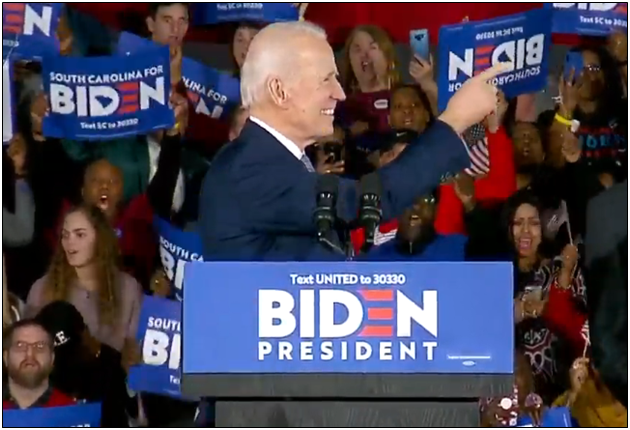Former Vice President Joe Biden’s presidential campaign is not dead yet with a win in the South Carolina Democratic presidential primary, throwing the contest into chaos, but Vermont Sen. Bernie Sanders, a self-described democratic socialist, still appears poised for a big performance in Super Tuesday on March 3.
Voting on Tuesday will occur in 14 states: Alabama, Arkansas, California, Colorado, Maine, Massachusetts, Minnesota, North Carolina, Oklahoma, Tennessee, Texas, Utah, Vermont and Virginia.
Of those, Sanders appears to be leading in California, Colorado, Maine, Massachusetts, Texas, Utah, Vermont and Virginia, whereas Biden only seems to have support in southern states with larger African American populations like North Carolina. Biden has to prove he can win somewhere besides the south, or else be consigned as a regional candidacy like George Wallace in 1972.
Bernie may still be the frontrunner after Super Tuesday with the lion’s share of the delegates for the Milwaukee convention with early voting that has been under way in the states, but the question remains whether he can get enough delegates to win outright on the first ballot there.
The website Fivethirtyeight.com projects that, based on the current polling for states ahead, Sanders will get about 1,600 delegates, more than any other candidate but still short of the 1991 needed to clinch the Democratic nomination. The Sanders camp fears that on the second or third ballot at the convention, the party establishment will steal the nomination.
This is where Sanders’ failure to knock Biden out of the race in South Carolina will loom large. For now, Biden can claim to finally have a viable yet difficult path to the nomination with his first primary win in 32 years — he ran in 1988 and 2008 without winning any states — after this year finishing fourth in Iowa, fifth in New Hampshire and second in Nevada.
The combination of a long and brutal contest for Democrats without a clear winner, coupled with a divisive convention, and Democrats may not be united coming out of Milwaukee. Either the radical socialist base of the party will be disenfranchised, who may then stay home, or Bernie will win, potentially costing him moderate Democratic and independent votes in the general election.
In the meantime, Biden’s win has made the Democratic primary a real horse race now between Biden and Sanders with Buttigieg fading (he came in a distant fourth in South Carolina), all but guaranteeing this will go on for months more and perhaps even all the way to the convention — all to the benefit of the reelection prospects of President Donald Trump.
Robert Romano is the Vice President of Public Policy at Americans for Limited Government.







